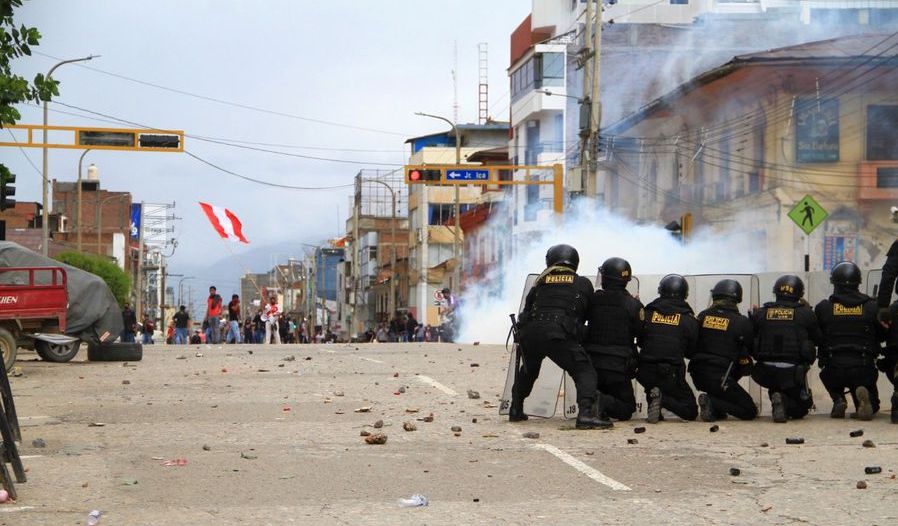
Sri Lanka’s President Gotabaya Rajapaksa declared a nationwide state of emergency April 2, as angry protests over fuel shortages and power cuts erupted in the capital Colombo. When police repression failed to quell the protests, Rajapaksa sought to appease demands for his resignation with a purge of his cabinet. The emergency order was lifted April 5—the same day Peru’s President Pedro Castillo imposed a curfew in Lima and its port of Callao in response to an eruption of protests over dramatic fuel price hikes. As street clashes broke out in the cities, farmers outraged at a jump in fertilizer costs blocked highways at several points around the country—including Ica, where a toll-booth was set on fire. The world has seen an oil price surge to $100 a barrel in the wake of Russia’s invasion of Ukraine. (The Hindu, PTI, NYT, Jurist, Al Jazeera, DW, BBC News, AFP, El Popular)
Photo: Twitter via La Tercera





Peru PM faces protest over praise of Hitler
Peru’s prime minister Aníbal Torres is facing demands for his resignation after he praised Adolf Hitler in a public address in the protest-hit town of Huancayo, saying the fascist dictator turned Germany into the “first economic power in the world.” (The Guardian)
Peru has faced repeated cabinet shake-ups since President Castillo took power last year.
Death in Peru protests under investigation
The curfew in Lima was lifted after one day, but five people were killed in the protests across Peru. The Fiscalía is investigating the death “in strange circumstances” of a 13-year-old girl amid the protests in Jauja, outside Huancayo in Junín region, whose body was found in a river bed. (EFE, AP, Reuters)
Violent unravelling in Sri Lanka
After two months of worsening protests, Sri Lankan Prime Minister Mahinda Rajapaksa has resigned—though his brother, President Gotabaya Rajapaksa, is refusing to step down. In the worst violence yet, pro-Rajapaksa mobs on May 9 assaulted protesters, leading to at least seven deaths and more than 250 injuries. Anti-government mobs set fire to the Rajapaksa family home, and several properties associated with the family and its supporters. Citing the escalating violence, the military has given security forces “shoot-to-kill” orders and permission to carry out warrantless arrests.
Sri Lanka’s worst economic crisis in decades has seen steeply rising food and fuel costs, and a fatal lack of medical supplies. Government efforts to secure credit lines for the badly cash-strapped nation have failed to lessen the economic pressures. President Rajapaksa’s continued refusal to resign has angered many Sri Lankans, who lay the crisis at the feet of the his government—blaming iy for systemic corruption and fiscal mismanagement. (TNH)
State of emergency extended in Sri Lanka
Sri Lankan acting President Ranil Wickremesinghe declared another state of emergency on July 17 as anti-government protests around the country entered their hundredth day. On July 13, the ruling president, Gotabaya Rajapaksa, fled the country with his family after the President’s House and the Prime Minister’s office in Colombo were stormed by demonstrators, resulting in the initial emergency decree. Back in May, Prime Minister Mahinda Rajapaksa resigned in response to the protests. Wickremesinghe then became prime minister. On July 15, President Rajapaksa formally resigned via email from Singapore. Prime Minister Wickremesinghe became the acting president. (Jurist)
While Sri Lankans celebrated Rajapaksa’s self-exile, acting President Wickremesinghe warned that the economy has “completely collapsed.” Spiralling national debt has led to rampant inflation and a shortage of fuel so severe that the country has gone under virtual lockdown. With the price of food skyrocketing, Sri Lankans are increasingly hungry, while a shortage of medical supplies has left a once-strong healthcare system in dire straits. The most recent estimates by the World Food Program suggest that nearly a quarter of the population is in need of food aid. (TNH)